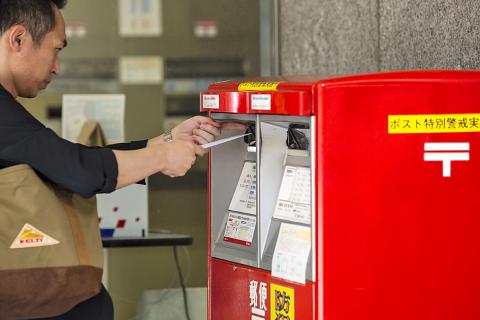Japan yesterday said it would sell off another chunk of its massive postal service in a share sale that could raise up to US$12 billion.
Tokyo said it would sell up to 990 million shares in Japan Post Holdings Co, or about 22 percent of its outstanding shares, the Japanese Ministry of Finance said in a statement.
The sale could raise ¥1.3 trillion (US$11.98 billion) based on yesterday ‘s closing price of ¥1,321.

Photo: Bloomberg
The sale price will be decided sometime between Sept. 25 and Sept. 27, it added.
After years of delays, ¥1.43 trillion was raised in an initial public offering (IPO) in late 2015 that included shares in Japan Post’s banking and insurance units.
The bulk of proceeds from selling shares in the government-owned behemoth were earmarked for reconstruction efforts after the 2011 earthquake and tsunami disaster.
The earlier sale came amid hopes starting to privatize what is effectively the world’s biggest bank by deposits could boost investor sentiment and spur efforts to cut red tape in Japan’s highly regulated economy.
The sprawling postal group has a network of about 24,000 bureaux across the nation and sits on assets worth more than ¥290 trillion.
The branches also offer services for cash deposits and insurance, and a local branch where many of Japanese retirees withdraw their pension payments.
That system has long drawn criticism both inside and outside Japan, with financial institutions, carrier services and foreign governments arguing that the public body was operating in sectors where it competed directly with private businesses.
Japan Post shares have not performed particularly well, closing yesterday below their ¥1,400 IPO price.

MARKET LEADERSHIP: Investors are flocking to Nvidia, drawn by the company’s long-term fundamntals, dominant position in the AI sector, and pricing and margin power Two years after Nvidia Corp made history by becoming the first chipmaker to achieve a US$1 trillion market capitalization, an even more remarkable milestone is within its grasp: becoming the first company to reach US$4 trillion. After the emergence of China’s DeepSeek (深度求索) sent the stock plunging earlier this year and stoked concerns that outlays on artificial intelligence (AI) infrastructure were set to slow, Nvidia shares have rallied back to a record. The company’s biggest customers remain full steam ahead on spending, much of which is flowing to its computing systems. Microsoft Corp, Meta Platforms Inc, Amazon.com Inc and Alphabet Inc are

Luxury fashion powerhouse Prada SpA has acknowledged the ancient Indian roots of its new sandal design after the debut of the open-toe footwear sparked a furor among Indian artisans and politicians thousands of miles from the catwalk in Italy. Images from Prada’s fashion show in Milan last weekend showed models wearing leather sandals with a braided design that resembled handmade Kolhapuri slippers with designs dating back to the 12th century. A wave of criticism in the media and from lawmakers followed over the Italian brand’s lack of public acknowledgement of the Indian sandal design, which is named after a city in the

The US overtaking China as Taiwan’s top export destination could boost industrial development and wage growth, given the US is a high-income economy, an economist said yesterday. However, Taiwan still needs to diversify its export markets due to the unpredictability of US President Donald Trump’s administration, said Chiou Jiunn-rong (邱俊榮), an economics professor at National Central University. Taiwan’s exports soared to a record US$51.74 billion last month, driven by strong demand for artificial intelligence (AI) products and continued orders, with information and communication technology (ICT) and audio/video products leading all sectors. The US reclaimed its position as Taiwan’s top export market, accounting for

INVESTOR RESILIENCE? An analyst said that despite near-term pressures, foreign investors tend to view NT dollar strength as a positive signal for valuation multiples Morgan Stanley has flagged a potential 10 percent revenue decline for Taiwan’s tech hardware sector this year, as a sharp appreciation of the New Taiwan dollar begins to dent the earnings power of major exporters. In what appears to be the first such warning from a major foreign brokerage, the US investment bank said the currency’s strength — fueled by foreign capital inflows and expectations of US interest rate cuts — is compressing profit margins for manufacturers with heavy exposure to US dollar-denominated revenues. The local currency has surged about 10 percent against the greenback over the past quarter and yesterday breached